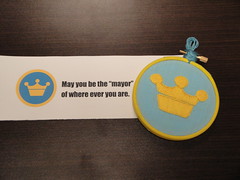

Frankenstein photo by rafapanadero used under CC license


One of the best feelings as a blogger is when someone takes the time to comment on a post. If they agree, it's affirming; if they disagree, but do so respectfully, it's a chance to grow and see ideas in a new light while rethinking your own position. I almost always enjoy the conversation.
One of the blog posts I wrote last summer that received some comments and feedback was on foursquare and its role in twitter. I posted here on this blog and on my former district's blog .
My point was that I thought foursquare and apps like it dilute the value of twitter and made it harder to explain the networked learning that occurs on twitter to those who are not in it. I suggested Foursquare made twitter more easy to dismiss. People who I'd talk to about twitter and learning looked at updates from grocery stores and fast food restaurants and decided this "twittering" was just not for them.
I was pleased to receive all comments, one by Vicki Davis (whose work I've followed for sometime) gave me some food for thought. And while I did not agree with all the comments - one comment closed with "I am not an educator robot," which I thought was ironic because the foursquare updates have a very robotic feel. I can almost here HAL900's voice state, "I just became the mayor of Starbucks on foursquare." I appreciate that folks took the time to post comments, and I did spend some time reflecting and wondering if this foursquare disgust was a little of my "old codger" flaring up and whether I had missed something.
Well, I'm at it again. And while I stand by my earlier thoughts about the twitter "noise" created by services like foursquare, I've changed my focus to some potential pitfalls to using foursquare or any other geolocation reporting apps.
Before making my case, there are at least a few items I want to make clear:
While it may be a sign I'm not that social to start with, the idea of self-reporting locations throughout my day seems on some level pointless, a little narcissistic and maybe even foolish to me when it first came out. Now I'm wondering if services like foursquare, gowalla and facebook locations might be . . . dangerous.
I know, I know I can hear myself saying that and thinking I sound just like some of the fearful internet safety presentations I've sat through and later tried to dispute. I'm not a cyber fear factor kind of guy. What would danah boyd say?
I'll start with a movie. I am a sci-fi movie fan and remember a scene from 2002's Minority Report , where protagonist John Anderton lives in a future where retina scans reveal locations, recent purchases made at the GAP and caters the ads to fit the person. The movie explores some important big themes regarding freedoms, surveillance and freewill. But I remember being a little creeped out by a future where every movement and purchase is potentially recorded and monitored. And I thought I wouldn't want anyone tracking all of my movements and behaviors like that. And we live in America - we'd never let that kind of surveillance happen.
I'll cry fowl when I feel like technology is invading our privacy, but this is another issue - this is incentivized self-reporting of location, habits and probable purchases using technology. I wonder if these are dangerous habits?
Report your every movement and purchase, and I'll give you a badge or a free latte. What would Orwell or Phillip K Dick think of this?
So when Please Rob Me came out, I thought it was a brilliant way to address the issue of "over-sharing." The site no longer reveals updates stating "We are satisfied with the attention we've gotten for an issue that we deeply care about." Apparently ICanStalkU feels it still has a point to make as they've continued to "raise awareness about inadvertent information sharing." But I'm not sure if some of us understand "over sharing" anymore. Or think about the caches of data it can create.
I'm not afraid of the "social web," and I know that is the direction the 'net is headed. But I'm not sure if this is the same as getting advice on a restaurant or film to see, and I wonder if this kind of self-reported surveillance has any unforeseen consequences for those "checking in."
Again am I wrong? Paranoid?
"And while new media bring with them new possibilities for openness, transparency, engagement, and participation, they also bring new possibilities for surveillance, manipulations, distraction, and control" - M. Wesch
A Few Related Links:
Photo under CC license http://www.flickr.com/photos/wiredwitch/5295175015/


